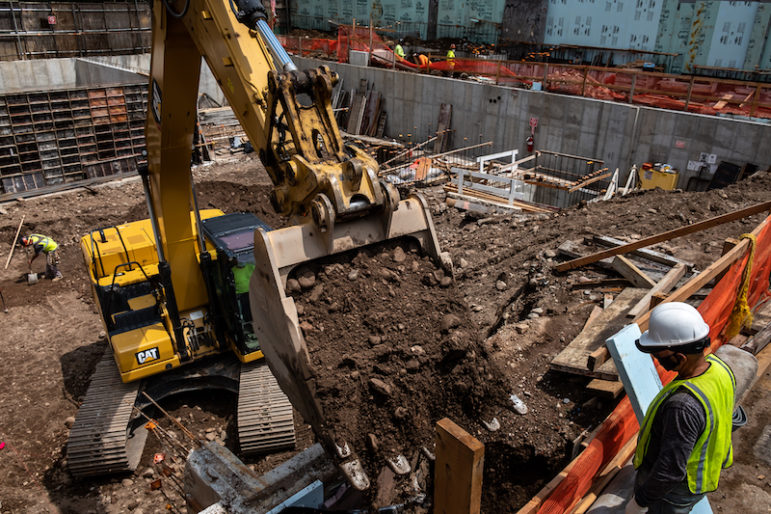‘This legislation demonstrates to workers across the state, especially immigrant and non-union workers, that they are valued. These workers put everything on the line in support of our state’s ability to make it through the pandemic and we cannot continue to fail them.’

Adi Talwar
Wage theft is a pervasive problem for New York workers, particularly in the private construction industry, the author writes.During this unprecedented time, we have seen the fragility of our economy and the deep inequalities in which we co-exist. Workers who are deemed essential for our survival are the same workers who we have failed as a society to recognize and value. Whether it is their personal health, the safety in their places of work, or their deserved compensation, low wage workers, predominantly immigrants and people of color, are too often the victims of greedy or careless employers who enrich themselves at the expense of their most vulnerable workers. It is time to change course.
This past month, New York State took a major step forward with the passage of the NY HERO Act, giving essential workers a voice when they have concerns about their safety in regard to airborne or other infectious diseases. It also protects workers from retaliation for speaking up.
This one-of-a-kind legislation is signaling to workers across the state that they are valued. New York can become the place where workers are treated with dignity and respect and become a model for the country. Unfortunately, a significant problem that remains prevalent, particularly in the private construction industry, is wage theft.
Of all labor violations, wage theft is a particularly insidious crime. Withholding or stealing rightfully earned wages robs workers of their dignity and places their families, for whom they are vital providers, at risk of structural distress.
What makes this injustice in the private construction industry especially reprehensible is that it targets workers with few or no advocates, particularly immigrant, Black, indigenious and non-union workers. With no one to speak on their behalf when their wages are ripped away, all they have is their own voice, which is often silenced as a result of intimidation, fear of termination or in some cases, deportation.
 CityViews are readers’ opinions, not those of City Limits. Add your voice today!
CityViews are readers’ opinions, not those of City Limits. Add your voice today!
Fortunately, there is a legislative relief on the table in Albany in S2766/A3350, which the State Assembly and Senate have passed. These bills would mandate more accountability by general contractors on construction projects, making them jointly and severally liable for wage theft violations committed by subcontractors on their construction site.
This legislation is crucial for several reasons. For one, it will incentivize general contractors to be more scrupulous in managing who is operating and what is done on their construction sites, promoting safer working conditions, and forcing subcontractors with a history of labor abuses out of the industry.
Second, it will provide a line of defense for workers who without this legislative protection have nothing standing in the way of them and labor abuses. Workers and their families stripped of their hard-earned wages would have the full force of the law at their backs to defend themselves and their livelihoods against bad actors in the construction industry.
Finally, this legislation demonstrates to workers across the state, especially immigrant and non-union workers, that they are valued. These workers put everything on the line in support of our state’s ability to make it through the pandemic and we cannot continue to fail them.
A full and equitable economic recovery from the devastation of the past year will undoubtedly require the empowerment of working people across New York State. The status quo cannot continue. With more opportunity burgeoning in the construction industry – from renewable energy projects to new affordable housing initiatives – it’s crucial that workers building the projects paving the way for New York’s future earn the wages, respect, and dignity they’re owed.
The governor must sign this bill immediately.
Maritza Silva-Farrell is the executive director at ALIGN, an alliance of labor and community organizations united for a just and sustainable New York.









One thought on “Opinion: NYS Lawmakers Passed a Bill to Combat Wage Theft. Now Cuomo Must Sign It.”
The A3350A is an explicit message to the American people- vicious employers that deliberately rob honest/robust workers, MUST—BE—HELD—ACCOUNTABLE to the fullest extent of the law.And the reason why this bill must must materialize into law, is because the shadows of neoliberalism are detrimental to our democracy.
The unionist are not extravagant- we only seek what is fair and reasonable☝️Ie., the A3350A is a valid equation with a science of check and balance. – this is not rocket science 🤦🏻♂️
I’m a proud LiUNA member with a conscience of worker rights.- human rights !-*The only prerequisite for understanding why the A3350A is the American way, is appreciating the philosophy of our founding fathers.
hp LiUNA
Steward of the Cement And Concrete Workers Local Union 20